Issue 54 : 3 May 2020
Talofa Lava, Kia Orana, Malo E Leilei, Tena Koutou, Hello ...
... and welcome to the latest issue of “For The Love Of The Game”, the official e-zine of the New Zealand Amateur Sport Association Inc. We hope you enjoy reading the articles below.
If you have any feedback on this issue, ideas for future articles, or would like to contact the Editor, please click here. And, you are invited to forward the e-zine to others you know, who may be interested in reading it.
Over the past fortnight, the national conversation has become more focused on the impact of the COVID-19 crisis on the organisations which support the delivery of sport to local communities, "for the love of the game". The Association welcomes your feedback and ideas, as it continues to advocate on behalf of organised amateur sport thoughout New Zealand.
If you are interested in applying for membership of the Association, please click here.
Viewpoint : "Thinking Backward To Go Forward" ...
Making predictions or forecasts about the future, without reference to experiences or knowledge gained in the past, can often result in poor outcomes. Cause-and-effect helps explain why present circumstances are so much better (or worse), than what might have otherwise been anticipated. Research suggests that the ability to link relevant facts or events into a plausible chain over time (or “thinking backward”), can result in better judgements about the future.

The idea that the COVID-19 crisis is a timely catalyst for widespread reform of New Zealand community sport is a seductive one, with many sporting codes possibly seeing an opportunity to “restructure the game” into a new model.
If doing so, it will be crucial for these codes to clearly identify their community purpose (why do they exist?), in consultation with all of their community stakeholders, while taking full account of the reasons why the current crisis is resulting in their urgent push for reform. Without that understanding, reform from the “top-down”, is unlikely to receive the endorsement or wholesale support from the “bottom-up”. Applying a heuristic model to community sport will only seek to further devalue the invaluable social experiences created by “the love of the game”.

At the present time, there is an unspoken risk that reform of sport at the community level may be seen as a necessity to ensure the viability of the elite game. To mitigate this risk, national sport administrators must spend as much time listening to the diverse needs of their community participants, (without whose support their game will diminish, regardless of any level of structural re-engineering), as they are looking at how to repair the holes in their corporate balance-sheets.
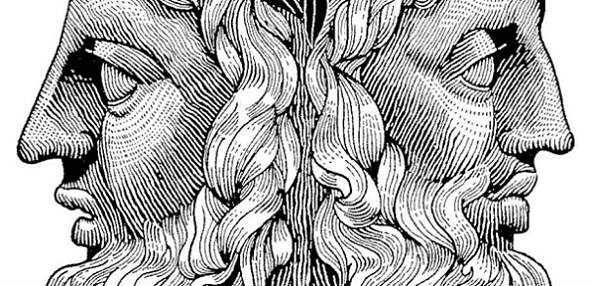
The Harvard Business Review notes that “like the god Janus in Roman mythology, whose head has two faces, one facing forward, the other backward, our thinking goes in both directions whenever we put our minds to work on making a decision.” The key is to ensure that both perspectives are deliberately factored into decisions regarding the future of community sport.
Grant-Funding Drought Will Have Material Impact On Club Liquidity ...
A review undertaken (by this Association) of the financial statements of 10 leading incorporated sports clubs with a combined annual income of over $2 million, representing 10 different sporting codes in the Wellington region, shows that on average, 25% of their total annual revenue is derived from grant-funding. When combined with membership subscriptions, on average around half of their annual income is generated from these two income sources alone.
Share Of Total Annual Club Revenue, By Source
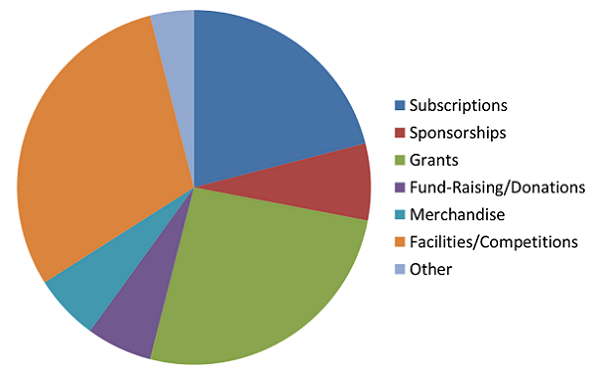
(Source: https://is-register.companiesoffice.govt.nz, NZ ASA analysis)
With major grant-funders to community sport throughout the country, including the New Zealand Community Trust, Pub Charity, the Infinity Foundation and Pelorus Trust all suspending consideration of grant-funding applications until further notice, community clubs may need to budget for at least a 25% reduction in revenue, for the foreseeable future.
With clubs unable to currently offer sport to communities, memberships are unlikely to be applied for (or renewed), meaning that not only that income, but income derived from club facilities is also in jeopardy. While sponsorships are only a relatively small proportion of the total annual revenue earned by the clubs sampled, local community businesses may not have the financial resources to maintain their support given their own loss of revenue.

Last week, the Association spoke with Radio New Zealand’s “Morning Report” on the role of community sport and the need for financial support from Government. You can listen to the report by clicking here, or you can read the story by Clay Wilson, by clicking here.
Wales Rugby Calls For An End To Amateur Player Payments ...
Chairman of the Welsh Rugby Union, Gareth Davies, has appealed to Welsh clubs not to pay players. Davies wants nominally amateur clubs (i.e. mainly those below the semi-professional Premiership), to stop paying players to play.
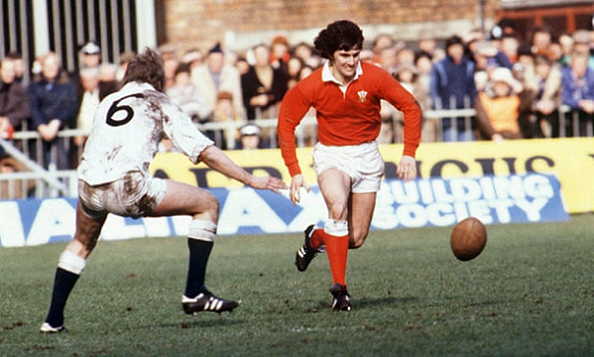
(Gareth Davies played 21 games for Wales and over 380 games for Cardiff)
Davies is concerned that much of the £11.8 million per annum that the national body gives to the community game is going to players, rather than being used to run clubs. (The average funding allocated to an individual club each season is approximately £6,500).
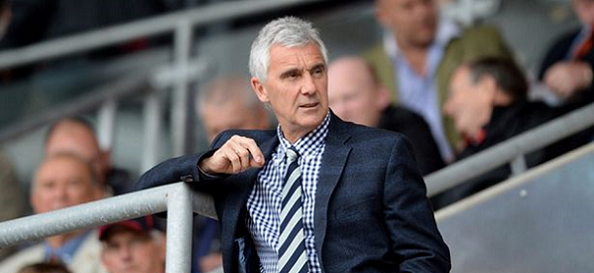
(Davies was elected Chairman of the Wales Rugby Union in October 2014)
Davies says, "the community game is the lifeblood of our sport, club players are also supporters, coaches, administrators and referees and alongside their families and social networks, they form the very DNA of Welsh rugby." He goes on to say that, if “… we all play for enjoyment, for our town or village of birth, for the club with whom we hold the strongest affinity … then no club will suffer the same threat of oblivion that is currently being felt in some quarters.”
You can read more about this story, by clicking here.
Sport England Launches £20 Million Community Emergency Fund ...
While Sport New Zealand awaits the outcome of a Government review of emergency funding for community sport, Sport England has already announced a £20 million (NZD$41 million) “Community Emergency Fund”, which is immediately available for clubs and community organisations to bid into. Grants (which are available regardless of whether or not a club has financial reserves) of between £300 and £10,000 can be applied for.

Here in New Zealand, the Government has contracted KPMG to undertake a review of the financial status of community sport, with the outcomes of the review to inform the Government as to what level of financial support it may be willing to provide. The Association has earlier offered to assist KPMG and Sport New Zealand in this review.
Professional Sport’s Heavy Toll On The Amateur Ranks ...
Lindsay Kerr received the Queen’s Service Medal for services to sport in 2019. Chairman of the Canterbury Country Cricket Association, he is also a former President of the Canterbury Regional Cricket Umpires Association. His long-term involvement in amateur community sport, has included roles with the Southbrook and Shirley Rugby Clubs, as well as being a member of the Canterbury Rugby Referees Association.
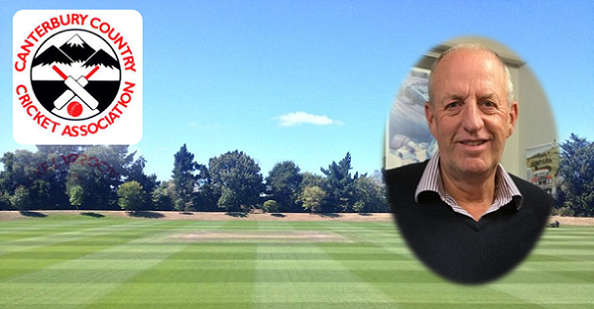
In the North Canterbury News, Kerr “laments the damage that professional sport has done to amateur sport”, suggesting that “few codes have escaped the greed that professional sport has created”. You can read more of Lindsay’s thoughts on the current crisis, by clicking here.
Auckland Rugby Offers Financial Support To Its Member Clubs ...
Up to $84,000 is available to the Auckland Rugby Football Union’s member clubs, as part of a new “Club Support Package” announced this week. Each of Auckland Rugby’s 21 clubs is eligible to apply for a support grant of $4,000 which will be paid in two equal monthly instalments, in May and June. Clubs can also apply to the Union’s “Club Hardship Fund” in situations of ongoing financial hardship, where clubs do not have access to cash reserves and/or other revenue streams.
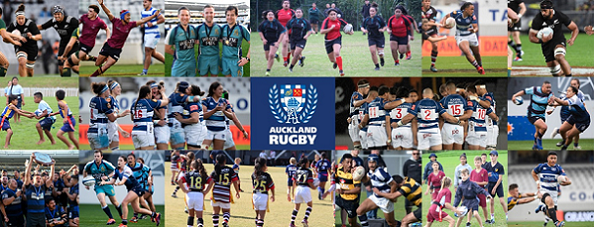
In providing the package, Auckland Rugby notes that its goals are: to contribute to club's overhead operating costs; to ensure clubs retain the ability to field both senior and junior teams; and to support community engagement and support the retention of staff, coaches and volunteers. You can read more about the package, by clicking here.
From The Archives ...
AMATEUR ATHLETICS
GISBORNE TIMES, VOLUME LXV, ISSUE 10312, 22 JANUARY 1927
GRANT MCDONALD’S SENSATIONAL RUN
“During his track career Grant McDonald has registered many fine efforts, but all were eclipsed when he beat Randolph Rose in a sensational finish in the half-mile. From the 15 yard mark he covered the distance in 2 mins 1 4-5 sec, which is equal to 2 mins 4 1-5 sec for the full distance. “McTavish” showed good judgment when he “tacked” in behind the famous distance star. His sprint up the straight was a ‘corker’ and Rose heartily congratulated him on his brilliant effort.”
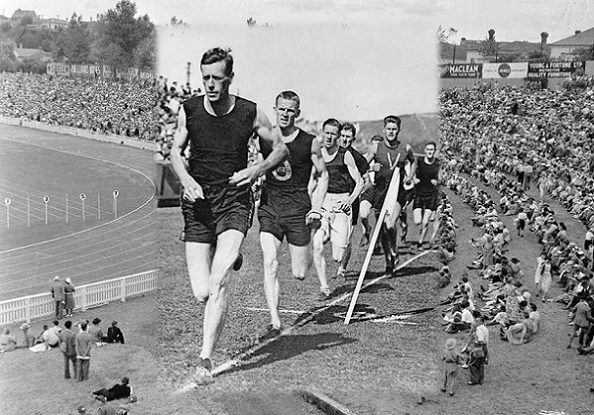
(Randolph Rose, one of New Zealand’s famous athletes of the 1920’s, leads the chasing pack)
Charles Grant (also known as “McTavish”) McDonald was Poverty Bay’s middle-distance star over the decade 1921 to 1931, being the regional champion over the quarter and half-mile. The son of Donald McDonald and Elizabeth Fraser, “McTavish” was born in Hamilton, in December 1896 and lived at 307 Childers Road in Gisborne with his family.
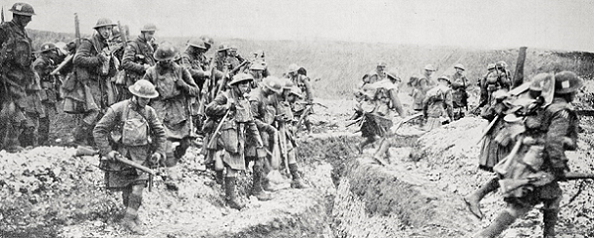
(McDonald was awarded the Military Medal for his service-in-action at Cambrai, in 1917)
Employed as Clerk at the Gisborne Sheepfarmers Meat Company, in World War One, as a 20 year old, McDonald enlisted with the Auckland Infantry Regiment (the “26th reinforcements”) and served on the battlefield in France at Cambrai. He was awarded the Military Medal for gallantry on the field, apparently for shooting “18 Huns in a pill-box with a Lewis machine gun”. Wounded in the right elbow and left leg, McDonald was evacuated to hospital on Glasgow, before being repatriated to convalesce in New Zealand in 1919.
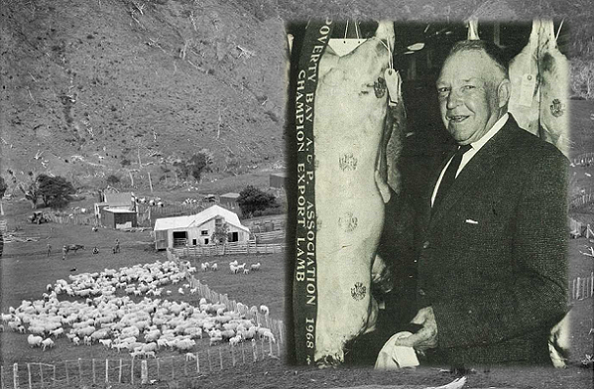
(Grant McDonald, pictured, took the title for the "Champion Lamb on the Hook", in 1968)
Despite his war injuries, McDonald became a star of the Gisborne Amateur Athletic and Harrier Club, defeating New Zealand’s best known middle-distance athlete Randolph Rose in 1927, before setting the Poverty Bay record for the half-mile in 1928 and then winning the Wellington Provincial Athletics Championship 880 yard title in 1929. On retiring from the track in 1931, McDonald initially moved to Masterton, before eventually returning to Poverty Bay to farm at “Omaha” in Manutuke until his death, on 5 January 1979.
The Final Word ...
“Society flourishes when businesses succeed, but it also does so when as many people as possible attain their full potential.”
(Helen Lewis, “The Atlantic”)